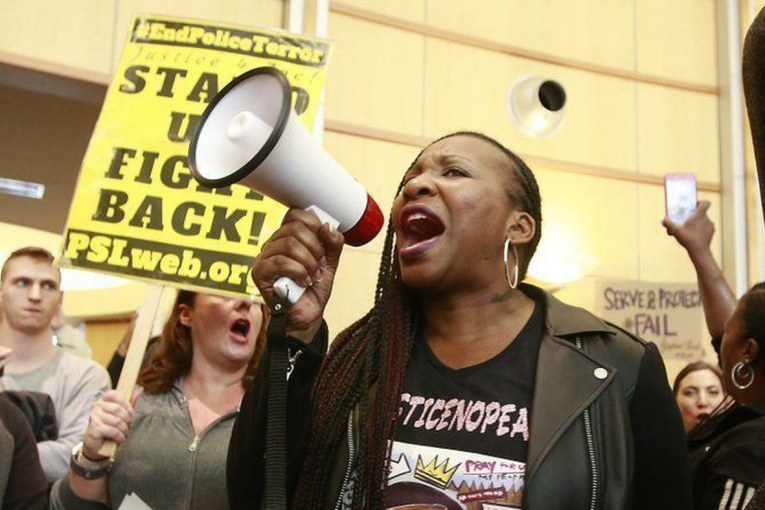

By Crescenzo Vellucci
Vanguard Capitol Bureau
SACRAMENTO – A CA Dept. of Justice report released this week on use of force policies within the Sacramento Police Dept. – despite being exceedingly in-depth and with glad-handing all around – was met, on first glance, by skepticism from community street organizers and a civil rights legal group.
The report, according to the DOJ, will “provide the Sacramento Police Dept. with a range of substantive recommendations…to strengthen the trust that must exist between our communities and law enforcement officers as they work to protect all Californians.”
In the same written statement, Sacramento Chief of Police Daniel Hahn said he wants SPD to “continue to seek ways to be a leader in law enforcement and to set an example of transparency, community involvement, and constant improvement.”
All nice, but the Sacramento community, especially as represented by Black Lives Matter and allies involved in street protesting for the past few years and especially since last March when Stephon Clark was gunned down, notes that the proof may be in the proverbial “pudding.”

Among the recommendations to the SPD are:
- More expressly connecting the sanctity of human life with use of force-related policies;
- Prohibiting certain problematic uses of force, including needlessly high-risk force, such as chokeholds, and shooting at or from moving vehicles;
- Establishing a Use of Force Review Board;
- Requiring annual use of force training for all staff, regardless of rank;
- Finding meaningful ways to incorporate community members into the lesson plan development process during training;
- Conducting formal after-action reviews with officers, supervisors, and command staff, following officer-involved shootings;
- Developing and implementing a community outreach plan that includes regularly scheduled and broadly accessible meetings with Sacramento residents; and
- Working towards providing greater transparency by consistently releasing information regarding use of force and other related topics.
Jamier Sale, a social justice street organizer around a myriad of causes, including ANSWER Coalition, wasn’t necessarily impressed with the shiny new document.
“Reports ring hollow when the Sacramento Police Department has gotten away with tens of murders and even more cases of abuse in just a few years. Whatever rules are in place will continue to be broken as long as the Police Officer’s Bill of Rights and the so-called justice system shield killer cops from prosecution,” said Sale.
And Tanya Faison, the lead organizer with Black Lives Matter Sacramento, noted, “These appear to be good recommendations, and a step in right direction. But we’ll see how many they put into place.”
Elizabeth Jolene Kim, president of the National Lawyers Guild Sacramento Chapter, was cautiously optimistic, stating “it is definitely appreciated for the sake of improved policies that the Attorney General’s Office has taken the matter seriously and made a significant number of recommendations to the police department. The challenge is seeing it through to actual implementation.”
The DOJ said SPD has “significant” deficiencies, including “out-of-date” Use of Force policies, which is the big criticism of a department responsible for the killing and shooting of Black and other suspects, and general rough handling of demonstrators and the homeless.
The DOJ also questioned how SPD handled internal investigations and citizen complaints.
“DOJ mentioned to me they found that when SPD internal affairs investigates, they use leading questions. It shows the corruption we have…the DOJ recommended that practice be changed. It’s not going to fix what is going on, but it may help to change IA policy,” said Faison.
Sale also remarked that “Murder has always been against the rules. That hasn’t stopped the police from killing people throughout the city with impunity.
“These nonbinding recommendations made by the Attorney General give the illusion of progress while in fact keeping in place the current reign of terror that has cost so many lives already. There can be no progress without justice. There can be no justice without jail for killer cops,” he said.
Faison noted that “We don’t know if officers are going to be punished for their actions. When we start seeing police being charged and seeing what SPD does, and how transparent they are when they do it, that’s going to determine what we think about this report.
“Unless there are repercussions when officers violate new policies, then this all doesn’t mean anything,” she said.
Among other DOJ recommendations – obviously targeting weak areas of SPD that have been roundly criticized by BLM, ANSWER and other groups – include:
- SPD’s use of force-related policies should more clearly define and describe when force is, and is not, authorized; create standards that more clearly define and build upon minimum legal requirements; and more clearly and consistently articulate a commitment to protecting the sanctity of life and de-escalation.
- SPD’s use of force-related policies should affirm the importance of proportionality (the concept that the nature or severity of the force that an officer uses should be consistent with the nature of the threat that a subject poses) and require that officers exhaust all reasonably available alternatives before using deadly force.
- SPD should prohibit certain problematic uses of force, including needlessly high-risk force, such as carotid restraints and shooting at or from moving vehicles.
- SPD should develop and implement policies for each use of force instrument its officers are authorized to use, including batons, chemical agents, and empty hand tactics.

END STORY….